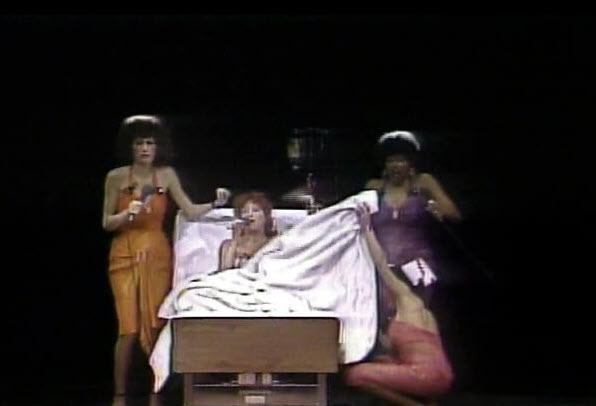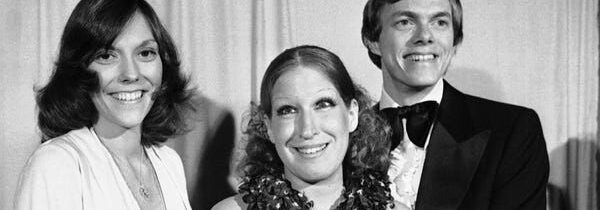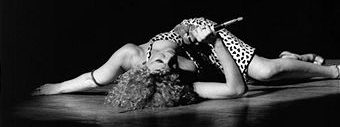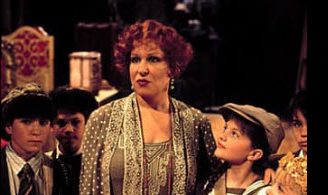The Los Angeles Times
The Divine Miss M – tired but original
SATURDAY, DECEMBER 27, 1975

In the continuing parade of new stars in pop music, there are precious few important originals. A star is simply s o m e o n e who achieves a certain level of popularity. An original, by contrast, is one who represents substantial change from the generally accepted musical and/or performing styles of the day, someone with enough daring and imagination to touch audiences in a sociological as well as musical way.
Pat Boone and Connie Francis were stars in the 1950s; Elvis’was an original. Tom Jones and Petula Clark were stars in the 1960s; Jimi Hendrix was an original. Mac Davis and Olivia Newton-John are stars in the 1970s; Bette Midler is an original.
When Midler arrived on the pop music scene in late 1972, there was almost a missionary zeal about her performance. Beneath the glitter, sass and tacky remarks of her “Divine Miss M” character, there was a clear sense of purpose that supplemented her pure entertainment value.
Midler’s every move on stage seemed designed to challenge an audience to enjoy itself, to feel some emotion, to step out from the protective shells that had begun to surround so many in these changing, somewhat uncertain times. Her harsh, aggressive cynicism was cushioned by a soft, unabashed sentimentality.
“I would really like to w a k e up people in this country a bit, say to them that they are really alive.” Midler said in 1972 on the eve of her local debut at the Troubadour Club. “They’ve had a bad time of it the past 10 years. There isn’t a lot of humor around today. I’m trying to say. Let’s have fun. Don’t be afraid to show your emotions.”
Striking a responsive chord in her a u d i e n c e , Midler quickly became the toast of both coasts: a cover subject in Newsweek, the star of a record-breaking concert engagement on Broadway, the winner of a Grammy for best new recording artist of 1973.
She was such a convincing, unchallenged star that it was a wonder the country wasn’t flooded with Divine Miss M caricatures on everything from lipstick cases to platform shoes.
But her success came so fast that some of her priorities and objectives got obscured ”“ She found herself struggling at times for her own emotional and professional balance. Like so many before her, stardom wasn’t the cleansing, wholly satisfying experience that the tiny (5 foot 1) redhead from Hawaii had long dreamed it would.be.
By the time Midler got to the 5,000-seat Universal Amphitheatre (just 10 months after her debut. at the 350-seat Troubadour), the strain was showing. Much of her early zeal had been replaced by a cool, professional gloss that only fed – as opposed to warmed or softened – the increasingly Mae West-ish tendencies of the Divine Miss M character.
Since most of the members of the Amphitheatre audience were seeing Midler for the first time, she no doubt remained for them a fresh and exciting new talent. The show was certainly loud and colorful. But Midler felt the change and it troubled her.
“The problem was that I had lost my innocence,” she said candidly during a break here last week from rehearsals for her first national tour in nearly two years. “I had become negative about a lot of things. It seemed like everything in the show was getting brash and vulgar, not as I had originally intended it. That’s what I’m trying to get away from now. I’m trying to regain that innocence.”
As she talked, there was little of the extroverted, exaggerated manner of the Divine Miss M image, There was nothing flashy about either her hairstyle or outfit, and the only times she went into the Divine vocal emphasis was for a bit of humor.
She was supposed to have started the 22-city tour Dec. 10 in Seattle, but an emergency appendectomy had forced her to cancel the first three cities.
“I’ve learned a lot of things about myself and my act,” she said. “All that success hit me so fast. It was less than a year between playing clubs and doing the Palace in New York. We were working almost every day. It seemed like we did 250 shows in two weeks. Things were just frantic on that (1973) tour.
“I was just swept away by the work. It just ballooned on us. It was exhausting. Because of that, some of the joy went out of it. It was nerve-racking. I mean nerve-racking, honey,” she said, slipping momentarily into the Divine character.
“At the end of the tour, I was so beat I didn’t’ have any spirit left. I was bitter. I was angry at everybody: the band, the girls who sing with me, Aaron (her manager Aaron Russo), but mostly I was angry at myself because I couldn’t control things any more.”
The result of that exhaustion and disillusionment was a year’s sabbatical. To get away from the demands and pressures, Midler, 30, went to Paris. “I was so tired that I spent 12 to 14 hours a day sleeping,” she sighed.
“I didn’t even see the city. I just slept and called room service.”
Eventually, Russo contacted her about going back to work. He outlined plans for a lavish Broadway revue, the eventual Clams on the Hall Shell show. But Midler was enjoying the time off too much. She didn’t want to return to concerts, yet. Russo told her frankly, that it was important that she do some more shows, If she stayed away too long, lie feared, the public might lose track of her and she would have to go through the grind of establishing herself all over again.
Midler agreed to do the Broadway show, but she wasn’t up to devoting much time to its planning so Russo and the others put the Clams revue together. Midler then stepped into the production much the same way a vocalist might step into a recording session to sing vocals on an album that had been largely designed and arranged by others.
The show was a critical and box-office smash. The demand for tickets was so strong”, in fact, that the run was stretched from four to 10 weeks. Every performance was sold out.







